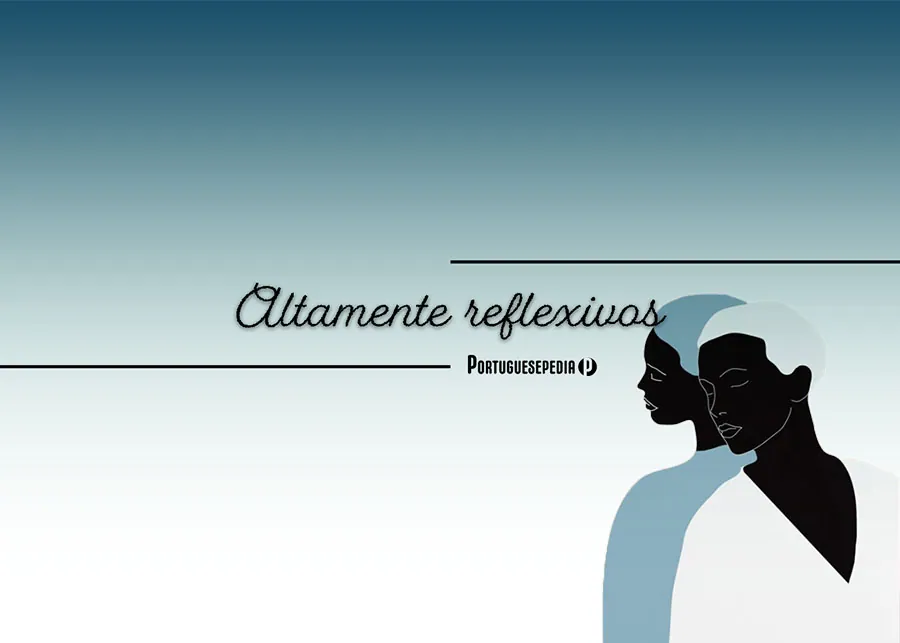
Portuguese Reflexive Verbs and Pronouns
Reflexive verbs are abundant in Portuguese and many of them are frequently used in everyday life.
It is easy for language learners – especially those unfamiliar with Romance languages – to leave out the reflexive pronoun when they need to say a reflexive verb. And yet, that little word can make all the difference!
More often than not, the non-reflexive version of a given verb means something different altogether. Note the different meanings of atrapalhar-se and atrapalhar in the following example:
| Ele atrapalhou-se e perdeu o controlo. He fumbled and lost control. Saí porque não quis atrapalhar ninguém. I left because I didn’t want to disturb anyone. |
Also, many language learners seem to struggle with getting to grips with the word order concerning the reflexive pronoun and the verb form.
In this article, you will learn (1) what reflexive verbs are and what they look like, and (2) where to place the reflexive pronoun in relation to the verb form.
You will also (3) get acquainted with commonly used Portuguese reflexive verbs and (4) learn about other uses of the pronoun -se. Read on
Portuguese reflexive verbs and pronouns
Reflexive verbs imply that the subject and object of a sentence are the same. In other words, the actions denoted by reflexive verbs bounce back to the subject.
In English, reflexive verbs are paired with reflexive pronouns such as myself, yourself, and herself, for example, I washed myself. Analogously, the same applies to Portuguese, that is, the verb forms are paired up with reflexive pronouns.
Here’s what Portuguese reflexive pronouns look like:
| SUBJECT PRONOUNS | REFLEXIVE PRONOUNS |
| Eu | me |
| Tu | te |
| Ele/ela | se |
| Nós | nos |
| Vocês | se |
| Eles/elas | se |
Here’s an example of a Portuguese reflexive verb:
| Cortar-se (Present tense) Cut oneself | |
| Eu | corto-me |
| Tu | cortas-te |
| Ele/ela | corta-se |
| Nós | cortamo-nos* |
| Vocês | cortam-se |
| Eles/elas | cortam-se |
* The first person plural of the verb drops its final -s when followed by the reflexive pronoun – from cortamos to cortamo(-nos).
Notice that the reflexive pronouns in the examples above come after the verb forms. However, there are cases where they swap positions. We will be looking into that in a moment.
As mentioned in the introduction, there are considerably more reflexive verbs in Portuguese than in English, which means that many Portuguese reflexive verbs have non-reflexive English equivalents. Here’s an example:
| Lembrar-se (Present tense) Remember | |
| Eu | lembro-me |
| Tu | lembras-te |
| Ele/ela | lembra-se |
| Nós | lembramo-nos |
| Vocês | lembram-se |
| Eles/elas | lembram-se |
Again, Portuguese reflexive verbs have, more often than not, a non-reflexive counterpart with a different meaning. For instance, while the verb lembrar-se means remember, the verb lembrar means remind.
Nearly all English reflexive verbs are also reflexive in Portuguese, which, in that case, becomes quite intuitive (at least for those of you with a good command of English).
Also, the English structure get + past participle normally has Portuguese reflexive equivalents (get injured > magoar-se; get dressed > vestir-se; get lost > perder-se; etc.)
There is, however, a large number of Portuguese reflexive verbs beyond the mentioned categories. It might be challenging for many to keep track of those, especially if you are not acquainted with other Romance languages from before.
If that’s your case, you’ll probably have to learn them by heart. But don’t fret, further down you’ll find usage examples of commonly used Portuguese reflexive verbs to help you become familiarised with them.
Let’s now turn our focus to word order.
Placement of Portuguese reflexive pronouns
Single verbs
Reflexive pronouns are normally placed after the verb form and linked to it by a hyphen:

Olá! I'm Pedro and I'm your Portuguese teacher.
Ready to unlock the beauty of European Portuguese? Portuguesepedia is your key! This all-in-one platform provides a wealth of learning resources, from bite-sized video lessons to immersive idiomatic dips. Perfect your pronunciation and aural comprehension with listening drills and solidify your grammar with in-depth articles. Start your Portuguese journey today!
Share this article
Get my guide "Key Strategies to Learn Portuguese" for FREE.
